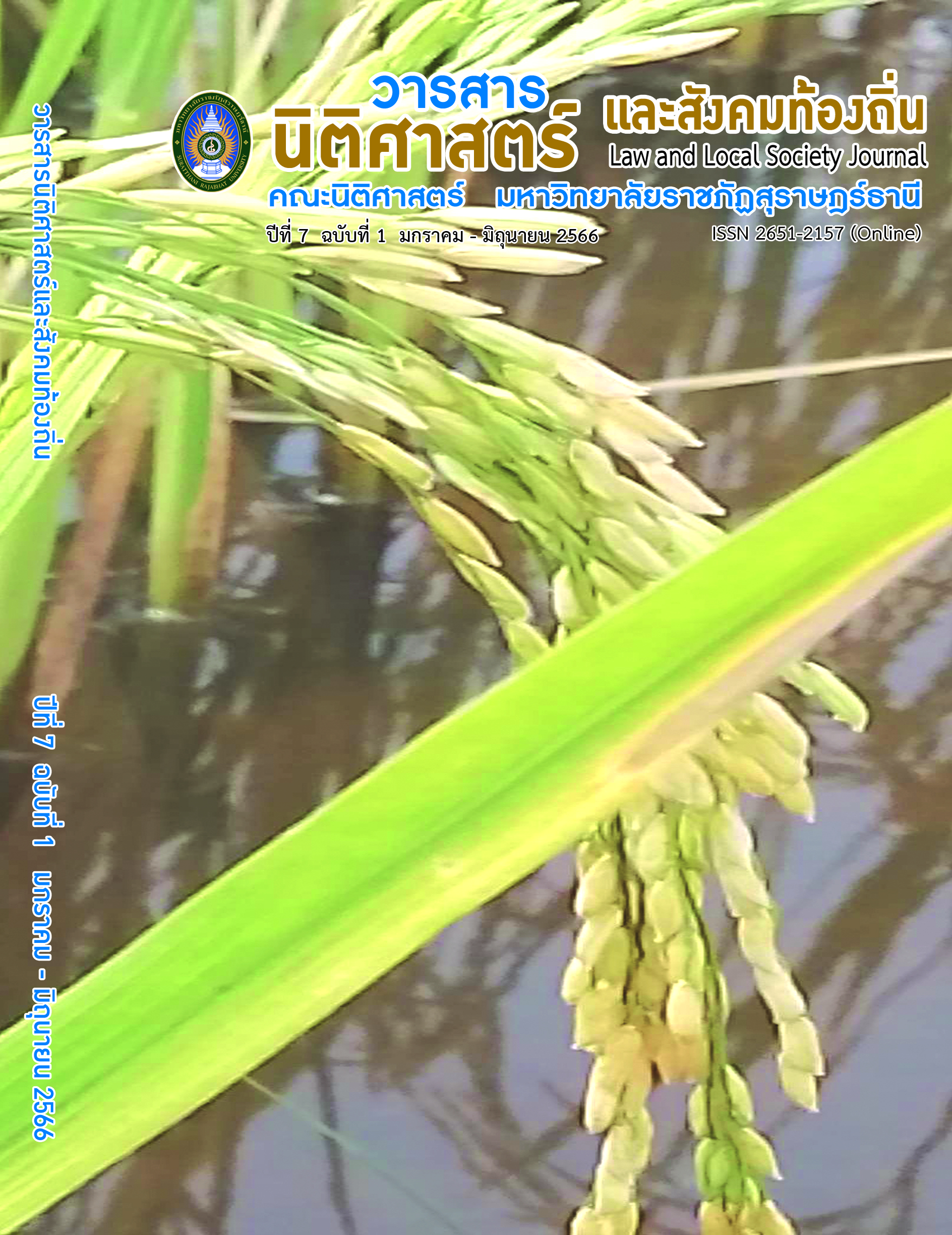การประยุกต์ใช้ปรัชญาเศรษฐกิจพอเพียงกับการบังคับใช้กฎหมาย ในประเทศไทย
คำสำคัญ:
ปรัชญาเศรษฐกิจพอเพียง, การบังคับใช้กฎหมายในประเทศไทย, การประยุกต์ใช้บทคัดย่อ
บทความวิชาการฉบับนี้มีวัตถุประสงค์เพื่อศึกษา ปรัชญาเศรษฐกิจพอเพียง การบังคับใช้กฎหมายในประเทศไทย และการประยุกต์ใช้ปรัชญาเศรษฐกิจพอเพียงกับการบังคับใช้กฎหมายในประเทศไทย การบังคับใช้กฎหมายดังกล่าวที่หย่อนประสิทธิภาพทำให้ไม่สามารถนำตัวผู้กระทำความผิดมาลงโทษได้นั้น ส่งผลต่อการพัฒนาทรัพยากรมนุษย์และการพัฒนาประเทศไทย กล่าวคือ ประชาชนเห็นว่าการฝ่าฝืนกฎหมายไม่ใช่ สิ่งเลวร้าย และเมื่อฝ่าฝืนกฎหมายก็ไม่ถูกดำเนินคดีแต่อย่างใด ซึ่งประชาชนชาวไทยจำนวนหนึ่งมักจะฝ่าฝืนกฎหมายเพื่อประโยชน์ของตนเองอยู่เสมอ
ผลการศึกษาพบว่า การบังคับใช้กฎหมายในประเทศไทยหย่อนประสิทธิภาพ เพราะมีปัจจัยหลายประการ เช่น การทุจริตและประพฤติมิชอบของเจ้าหน้าที่รัฐ ความหย่อนสมรรถภาพการบังคับบัญชา ประชาชนชาวไทยบางคนขาดวินัยในการครองตน ขาดการขัดเกลาทางสังคม เป็นต้น
ผู้เขียนมีข้อเสนอแนะดังต่อไปนี้ ควรบังคับใช้กฎหมายกับการดำเนินชีวิตแบบพอประมาณ ยึดถือผลประโยชน์ส่วนรวมเป็นเป้าหมายสูงสุด และต้องป้องกันไม่ให้ผู้ใดกระทำผิดกฎหมาย ควรใช้กฎหมายอย่างมีเหตุผลได้มาตรฐานในการบังคับบัญชา ไม่ทุจริตและประพฤติมิชอบ และมีการใช้กฎหมายอย่างมีเหตุผล มีมาตรฐานในการบังคับบัญชาต่อผู้ใต้บังคับบัญชาโดยเคร่งครัด ประชาชนควรสร้างภูมิคุ้มกันด้วยการเรียนรู้กฎหมาย ไม่เอารัดเอาเปรียบผู้อื่น เรียนรู้กฎหมายอย่างรอบด้าน สร้างระเบียบวินัยในตน และปฏิบัติตามกฎหมายโดยเคร่งครัด
เอกสารอ้างอิง
Anek Nakhabut. (1988). Thai Countryside in Three Decades with Lessons from Folk Wisdom towards the Direction of Rural Self-Reliance in the Future. [Alternatives for Development Booklet]. 6,1 (January 1988).
Chaipattana Foundation (N.D.). Sufficiency Economy. Retrieved on 2 May 2023, from https://www. chaipat.or.th/publication/publish-docume nt/sufficiency-economy.html
Charan Phakdithanakun. (30 March 2022). Sufficiency Economy Philosophy, Dasavidha-Rajadhamma and Rule of Law on the Application of Thai Law. Faculty of Law, Suratthani Rajabhat University.
Chulalongkorn University. (N.D.). Royal Guidance. Retrieved on 26 April 2022, from https://www.kingrama9.chula.ac.th/kings-guidance/157/.
Kasem Watanachai. (28 March 2012). Philosophy of Sufficiency Economy and Way of Life. Retrieved on 21 May 2023, from http://social.nesdc. go.th/social/Portals/0/Documents/Sufficiency Economy Philosophy and Living.pdf.
Kasetsart University. (N.D.) Royal Speech on 18 July 1974. Retrieved on 26 April 2022, from https://www.web.ku. ac.th/king 72/king_rem/2517-1.html
Nantawan Rattiwat. (2011). Socialization of Adolescents in Foster Home: A Case Study of Rajvithi Home for Girls. Master of Public Administration, National Institute of Development Administration.
Parameter Wimonsiri. (2016, September-December). Sufficiency Economy Philosophy for Sustainable National Development Planning. Retrieved on 21 May 2023, from https://so06.tci-thaijo.org/index.php/.kpi_ journal/article/download/244195/165606/849333.
Pat Suchamong, et. al. 1981. Integrated Rural Development for Thailand. Bangkok : Thai Wattana Panich.
Pison Pirun. (2013). Rule of Law and Law Enforcement. Retrieved on 26 April 2022, from https://www.constitutionalcourt.or.th/occ_web/ewt_dl _link.php ?=1165.
Preeyanuch Pibulsarawut. (2008). Royal Treasury and the Sufficiency Economy Philosophy. Bangkok : Petchrung Printing Co., Ltd.
Sufficiency Education Center, Foundation of Virtuous Youth. (N.D.). Main Meanings and Explanations: Philosophy of Sufficiency Economy. Retrieved on 24 May 2023, from http://www.sufficiency.nida.ac.th /sufficiency-meaning/
The Office of the Royal Development Projects Board. (N.D.). Royal Speech on 4 December 1998. Retrieved on 22 April 2022, from https:// www.rdpb.ogo.th/rdpb/visit/Philosophy_of_economy.html.
V. Vajiramethi. (2007, 12-18 January). Confusion about Sufficiency Economy. Nation Weekend, 15(763).
ดาวน์โหลด
เผยแพร่แล้ว
รูปแบบการอ้างอิง
ฉบับ
ประเภทบทความ
สัญญาอนุญาต
ลิขสิทธิ์ (c) 2023 วารสารนิติศาสตร์และสังคมท้องถิ่น

อนุญาตภายใต้เงื่อนไข Creative Commons Attribution-NonCommercial-NoDerivatives 4.0 International License.
บทความที่ได้รับการตีพิมพ์ในวารสารนิติศาสตร์และสังคมท้องถิ่น คณะนิติศาสตร์ มหาวิทยาลัยราชภัฏสุราษฎร์ธานี ถือเป็นลิขสิทธิ์ของวารสาร ทั้งนี้ ข้อมูล เนื้อหา และข้อคิดเห็นที่ปรากฏในบทความเป็นความรับผิดชอบของผู้เขียนแต่เพียงผู้เดียว กองบรรณาธิการไม่มีความจำเป็นต้องเห็นด้วยหรือร่วมรับผิดชอบใด ๆ
เนื้อหา ข้อมูล รูปภาพ และองค์ประกอบอื่น ๆ ที่ได้รับการตีพิมพ์ในวารสารฯ อยู่ภายใต้ลิขสิทธิ์ของวารสารนิติศาสตร์และสังคมท้องถิ่น การนำไปเผยแพร่ ดัดแปลง หรือใช้ประโยชน์ในลักษณะใด ๆ ไม่ว่าเป็นบางส่วนหรือทั้งหมด ต้องได้รับอนุญาตเป็นลายลักษณ์อักษรจากวารสารก่อน


